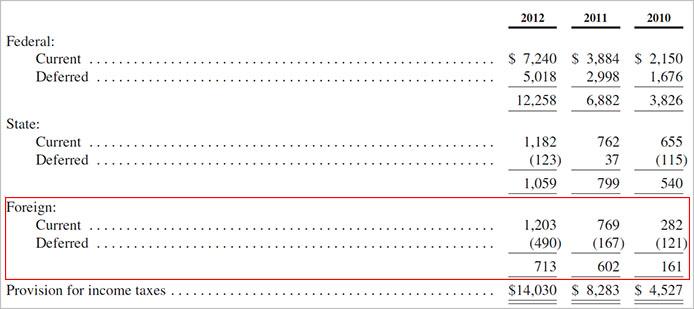Numbers from Apple's 10-K filing with the U.S. Securities and Exchange Commission reveal that the company paid only 1.9 percent in income taxes on $36.8 billion of foreign revenue for the 12-month period ending on Sept. 29.
After accounting for $490 million in deferrals, Apple paid a total of $713 million in foreign income tax over the past year, equating to only a fraction of the combined $13.32 billion in U.S. federal and state taxes that were levied at a rate of 35 percent.
As noted by The Washington Post, Apple's growth in foreign markets has been a main driver to the company's continued success, with this year's $36.8 billion in pretax earnings representing a 53 percent increase from fiscal 2011, when the company brought in $24 billion. In 2010, Apple paid a foreign tax rate of 1.2 percent on earnings of $13 billion.
The high U.S. corporate tax rate has prompted many American multinationals to leave cash in foreign accounts, as repatriating the money would cause it to be subject to taxation.
As of Sept. 29, $82.6 billion of Apple's cash, cash equivalents and marketable securities were held by foreign subsidiaries. The is up 52 percent from 2011, when the company had $54.3 billion in offshore holdings.
Apple does account for a portion of its foreign profits as subject to U.S. taxation, however, which is recorded in quarterly statements as a liability. These so-called "phantom" tax obligations could theoretically be eliminated, thereby raising the company's profits by up to $10.5 billion for the past three years.
Where Apple does differ from other companies is that it sets aside a portion of the foreign profits, marking them as subject to U.S. taxes sometime in the future.
When Apple reports quarterly results, it records that portion of the taxes as a liability, which is subtracted from its profits even though it hasn’t actually paid the taxes.
Tax experts say that Apple is unlikely to make such a move, however, as erasing the huge U.S. obligation would be detrimental to its stature as a responsible tax payer. According to The Post, the Cupertino company is said to be lobbying to change U.S. tax law to ease repatriation costs if and when it decides to bring the money back into the country.
 Mikey Campbell
Mikey Campbell







-m.jpg)






 Christine McKee
Christine McKee
 Malcolm Owen
Malcolm Owen

 William Gallagher
William Gallagher



 Wesley Hilliard
Wesley Hilliard


-m.jpg)




191 Comments
Disgusting.
Cue: Socialists and Marxists.
Wow...so much for bringing the labor back home.
Disgusting.
Yes, I think you are too. Your username fits you nicely.
"In 2010, Apple was paid a foreign tax rate of 1.2 percent on earnings of $13 billion." Wow, Apple "was paid" tax. And the rest of us pay it. No wonder the profits are so high!